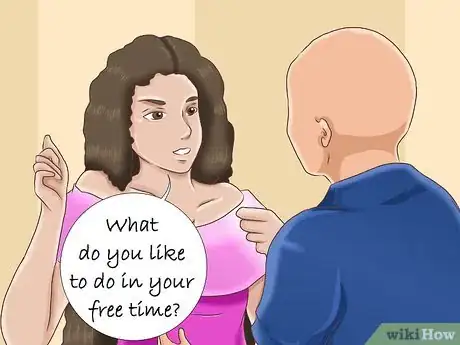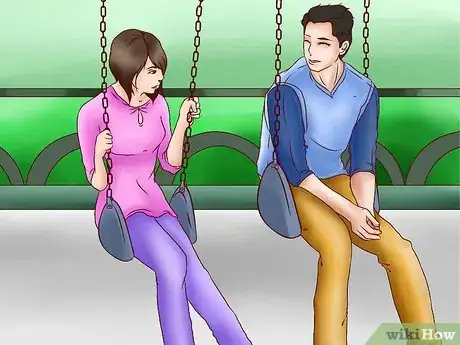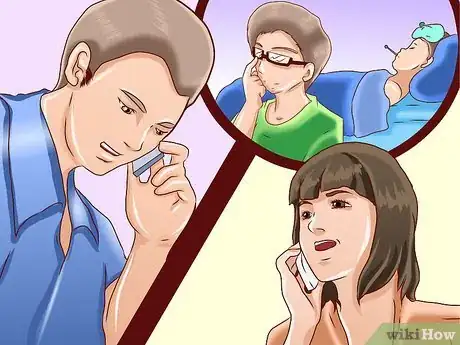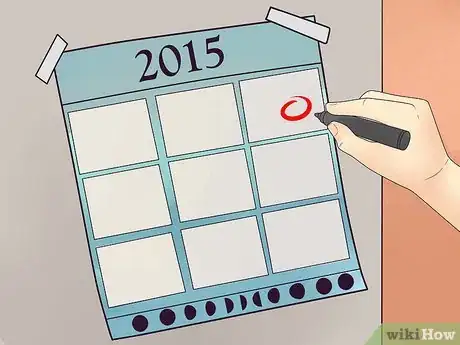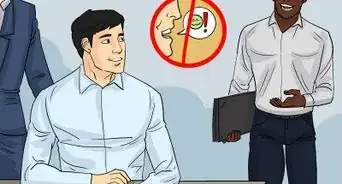This article was co-authored by Katie Styzek. Katie Styzek is a Professional School Counselor for Chicago Public Schools. Katie earned a BS in Elementary Education with a Concentration in Mathematics from the University of Illinois at Urbana-Champaign. She served as a middle school mathematics, science, and social studies teacher for three years prior to becoming a counselor. She holds a Master of Education (M.Ed.) in School Counseling from DePaul University and an MA in Educational Leadership from Northeastern Illinois University. Katie holds an Illinois School Counselor Endorsement License (Type 73 Service Personnel), an Illinois Principal License (formerly Type 75), and an Illinois Elementary Education Teaching License (Type 03, K – 9). She is also Nationally Board Certified in School Counseling from the National Board for Professional Teaching Standards.
There are 7 references cited in this article, which can be found at the bottom of the page.
This article has been viewed 201,474 times.
Whether you bump into a stranger at the mall or on the internet, making them a friend can be intimidating. The important thing to remember is that they are likely just as intimidated. The key to starting and keeping successful friendships is to genuinely connect and share with another person. This begins with your first conversation and holds true for as long as you remain friends.
Steps
Connecting with a Person You Don’t Know
-
1Greet the person and exchange names. This is often the first step in starting a conversation with someone you don’t know.[1] By giving them your name, and asking theirs, you create the opportunity for more conversation. If you are at a formal event, this can be done in a more professional manner such as, “Hi, I’m Mike with AT&T,” or if the occasion is less formal you can simply say something like “Hi, I’m Mike.” [2]
- Once you introduce yourself, the other person will likely be compelled to do the same.
- You can also ask them what grade they're in.[3]
-
2Ask the person something about themselves. Keep it simple, but ask a question that requires more than a one word answer. If this is your first time meeting someone, don’t lead with “So, how many kids do you plan to have?” You should act comfortable with the person, but being overly personal might cause them to become defensive. Try something a little more shallow, like “Have you seen the new Star Wars movie,” instead.[4]
- It can also be a good idea to compliment them.
Advertisement -
3Share something about yourself with them. Now that you’ve learned something about your soon-to-be friend, it is your turn to share. Opening up to someone will make them feel like they know you better and they will be more willing to open up to you. Be sure to keep your sharing on about the same level that they are sharing. You should maybe mention what you thought about the new Star Wars movie, rather than jumping right into your deepest secrets.[5]
-
4Discuss the situation you are both in. For some reason, you have both ended up in the same place at the same time. This event could be a great conversation starter. Ask them what brought them there today (unless it’s something like a mandatory business meeting, then the answer is obvious). You can also reflect on the situation, saying something like “I came to see the exhibit today because I really enjoy the museum of natural history.”[6]
- It’s a good rule of thumb to be positive. Saying something like “Man I really hate coming to these stupid meetings every month,” might make you seem pessimistic and cause the other person to have reservations about starting a friendship.
-
5Bring up any interests that you might have in common. Sometimes you will gain context clues through your conversation that will tell you a little bit about the person’s interests. You can also gain context clues from where the meeting has taken place, what they are wearing, and any piece of the environment around you. Use those to make a guess at something that the person has an opinion about (regardless of what the opinion is). Whatever common interest that is, it can be a great conversation starter.[7]
- For example, if you are at business conference, you can assume that they do some kind of work in a similar field. Ask general questions about the field that you both work in.
-
6Provide some kind of help to the person. The more attentive you are to the person, the more opportunities you will see to offer help. This could be something large, like introducing them to a potential employer. You can also offer immediate help, like helping them clean up after an event. Whatever help you offer, the gesture will usually be well received.[8]
- Do not be pushy about helping someone. If they insist that they do not need help, allow them to thank you for offering and simply tell them that the offer stands.
Starting the Friendship
-
1Ask to exchange contact information. This can be tricky no matter what situation you are in. If you are at a social event, asking for a phone number or other information too soon might make you seem clingy. In business events it can make you seem desperate and overzealous. You should only exchange information once you have had a conversation with the person and made a connection of some kind.[9]
- Do not give them your information unless they ask. Instead, if you are interested in following up, ask them for their information. This way, you are in control of the follow up.
-
2Make a time to meet again. All nice run-ins have to come to an end sometimes, but that doesn’t mean you have to go back to being strangers. Ask your new potential friend if they’d like to do something together sometime. This can be either social or business.[10]
- You might ask them to join you for cookout if you are looking to make a social connection. If you are looking to make a business friend, you might invite them to a conference you are hosting or attending.
-
3Continue to deepen the connection with that person. Once you and your friend reunite, you will need to make that event memorable as well. Make an effort to connect with the person again, this time sharing and asking a little more than last time. This will allow you both to know each other a bit better and likely lead to another get together of some sort.[11]
Maintaining the Friendship
-
1Talk to them regularly. You do not need to talk to your friends every day. You should talk often, though. There is no set rule for how many times per month or year you communicate, but if it feels like it has been too long since you talked, it probably has been. Texting, emailing, and social media are often much easier to manage than phone calls.[12]
-
2Try to see them often. Unless you work with your friend or live close to each other, you probably won’t see each other daily, or even weekly. You should make an effort to spend time together as often as you both can, though. This allows you more opportunities to bond and create a more personal connection. [13]
-
3Make any time that you spend together count. While there is no set rule for how much time you spend together, it is important to make that time be memorable. Put away any distractions that would prevent you from bonding with your friend (like a cell phone). Focus entirely on your friend and the time that you are spending together, and they will appreciate you even more.[14]
Making Friends on Social Media
-
1Message, follow, or add the person. With social media, friends are just a click away ― sort of. Depending on the platform you are using (Facebook, Twitter, etc.) you can take different actions to befriend someone, if their privacy settings allow it. If you want to say something very specific, it might be best to message the person privately first. Otherwise, you can follow them or add them as a friend.[15]
-
2Introduce yourself to them ― always. If you are sending a message to a stranger, this should be the first thing you do. If you are adding someone as friend or following them on some social media platform, you should follow up with a message as soon as they accept or acknowledge that you reached out. They will likely want to know who is trying to be their friend and why.[16]
-
3Tell them why you noticed their profile. In some cases, such as celebrity profiles, this is obvious. Other times, the person might not be sure why you are trying to add them. Many people are suspicious of strangers on the internet, and if you want to avoid being shrugged off, you need to make an impression. Following your introduction, tell the person exactly why you added them and what you hope to share with or learn from them. This can help make the more receptive to your efforts.[17]
-
4Tell them a bit about yourself. This will help put the person at ease about your intentions. If you added them and mentioned that you have the same profession and notice something they were doing well, the common interest and flattery is likely to get their attention. If you simply add someone and say “Hi, I want to be your friend because I saw your profile,” they have no idea what your motivation for reaching out to them is.[18]
- Dating profiles can be a little different. Usually, reaching out to someone “because you liked their profile” is more acceptable in this sense.
-
5Ask questions to keep the conversation rolling. Once the person is comfortable responding to you and having a conversation, keep them engaged with questions. Make sure that your questions stay pretty on topic with your reason for adding them in the beginning, but you can start to explore other topics once you both get comfortable talking. Do not reference too much of their profile or try to comment on everything that they do. This may make people uncomfortable.[19]
-
6Set up a time and place to meet in person. If you have been talking online and mutually agree that you should meet in person, then set a time and place! Now, you and your new friend will have the chance to share things with each other face to face and create an even deeper connection. Keep in mind that things might still be a little strange the first time you meet in person. When all else fails, go back to a successful conversation that you had online.[20]
Expert Q&A
-
QuestionHow do you meet new friends when you have none?
 Katie StyzekKatie Styzek is a Professional School Counselor for Chicago Public Schools. Katie earned a BS in Elementary Education with a Concentration in Mathematics from the University of Illinois at Urbana-Champaign. She served as a middle school mathematics, science, and social studies teacher for three years prior to becoming a counselor. She holds a Master of Education (M.Ed.) in School Counseling from DePaul University and an MA in Educational Leadership from Northeastern Illinois University. Katie holds an Illinois School Counselor Endorsement License (Type 73 Service Personnel), an Illinois Principal License (formerly Type 75), and an Illinois Elementary Education Teaching License (Type 03, K – 9). She is also Nationally Board Certified in School Counseling from the National Board for Professional Teaching Standards.
Katie StyzekKatie Styzek is a Professional School Counselor for Chicago Public Schools. Katie earned a BS in Elementary Education with a Concentration in Mathematics from the University of Illinois at Urbana-Champaign. She served as a middle school mathematics, science, and social studies teacher for three years prior to becoming a counselor. She holds a Master of Education (M.Ed.) in School Counseling from DePaul University and an MA in Educational Leadership from Northeastern Illinois University. Katie holds an Illinois School Counselor Endorsement License (Type 73 Service Personnel), an Illinois Principal License (formerly Type 75), and an Illinois Elementary Education Teaching License (Type 03, K – 9). She is also Nationally Board Certified in School Counseling from the National Board for Professional Teaching Standards.
Professional School Counselor Join an after-school club! This is a fantastic way to meet people who enjoy the same things that you do.
Join an after-school club! This is a fantastic way to meet people who enjoy the same things that you do. -
QuestionCan you make friends volunteering?
 Katie StyzekKatie Styzek is a Professional School Counselor for Chicago Public Schools. Katie earned a BS in Elementary Education with a Concentration in Mathematics from the University of Illinois at Urbana-Champaign. She served as a middle school mathematics, science, and social studies teacher for three years prior to becoming a counselor. She holds a Master of Education (M.Ed.) in School Counseling from DePaul University and an MA in Educational Leadership from Northeastern Illinois University. Katie holds an Illinois School Counselor Endorsement License (Type 73 Service Personnel), an Illinois Principal License (formerly Type 75), and an Illinois Elementary Education Teaching License (Type 03, K – 9). She is also Nationally Board Certified in School Counseling from the National Board for Professional Teaching Standards.
Katie StyzekKatie Styzek is a Professional School Counselor for Chicago Public Schools. Katie earned a BS in Elementary Education with a Concentration in Mathematics from the University of Illinois at Urbana-Champaign. She served as a middle school mathematics, science, and social studies teacher for three years prior to becoming a counselor. She holds a Master of Education (M.Ed.) in School Counseling from DePaul University and an MA in Educational Leadership from Northeastern Illinois University. Katie holds an Illinois School Counselor Endorsement License (Type 73 Service Personnel), an Illinois Principal License (formerly Type 75), and an Illinois Elementary Education Teaching License (Type 03, K – 9). She is also Nationally Board Certified in School Counseling from the National Board for Professional Teaching Standards.
Professional School Counselor Absolutely! Volunteer work is a great way to meet new people, whether it's through a school, a religious group, or a local community organization.
Absolutely! Volunteer work is a great way to meet new people, whether it's through a school, a religious group, or a local community organization.
Warnings
- Know the difference between business friends and personal friends. Sometimes the two intertwine, but other times there are boundaries. For example, you might not want to ask your married boss out to dinner and a movie, even just as friends.⧼thumbs_response⧽
- Understand that you will sometimes be rejected, and that’s okay. Not all people are meant to be close friends.⧼thumbs_response⧽
References
- ↑ Katie Styzek. Professional School Counselor. Expert Interview. 26 March 2021.
- ↑ http://tinybuddha.com/blog/11-ways-to-turn-strangers-into-friends/
- ↑ Katie Styzek. Professional School Counselor. Expert Interview. 26 March 2021.
- ↑ http://tinybuddha.com/blog/11-ways-to-turn-strangers-into-friends/
- ↑ http://www.succeedsocially.com/startconversations
- ↑ http://www.succeedsocially.com/startconversations
- ↑ http://tinybuddha.com/blog/11-ways-to-turn-strangers-into-friends/
- ↑ http://www.forbes.com/sites/theyec/2012/04/25/the-7-pillars-of-connecting-with-absolutely-anyone/#56d37a5e7d8b
- ↑ http://www.careerealism.com/3-rules-to-smart-business-card-etiquette/
- ↑ http://www.succeedsocially.com/startconversations
- ↑ http://www.forbes.com/sites/theyec/2012/04/25/the-7-pillars-of-connecting-with-absolutely-anyone/#56d37a5e7d8b
- ↑ https://www.psychologytoday.com/blog/compassion-matters/201301/5-ways-maintain-lifelong-friendships
- ↑ https://www.psychologytoday.com/blog/compassion-matters/201301/5-ways-maintain-lifelong-friendships
- ↑ https://www.psychologytoday.com/blog/compassion-matters/201301/5-ways-maintain-lifelong-friendships
- ↑ http://www.hongkiat.com/blog/facebook-etiquette/
- ↑ http://www.hongkiat.com/blog/facebook-etiquette/
- ↑ http://www.hongkiat.com/blog/facebook-etiquette/
- ↑ http://www.hongkiat.com/blog/facebook-etiquette/
- ↑ http://www.hongkiat.com/blog/facebook-etiquette/
- ↑ http://www.hongkiat.com/blog/facebook-etiquette/
About This Article
The first thing you need to do to become friends with someone is get to know them better so you can start hanging out. Try offering to help them with something or starting a conversation about something you have in common. Once you've chatted a few times and you're a little more comfortable with each other, then you can work on becoming friends. Ask them to exchange contact information and make plans to do something together sometime. You can also add them on social media so you can talk more when you're not with them. For more social tips from our co-author, including how to have a good time when you hang out with your new friends, read on!


